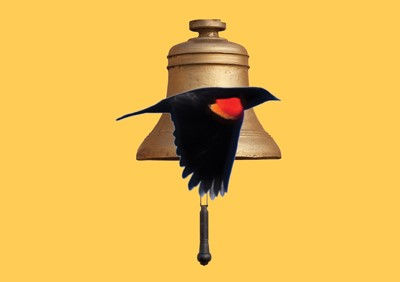The Bell and the Blackbird

We began our Lenten journey with the Ash Wednesday ritual of the imposition of Ashes on our foreheads. Throughout the world, millions of Christians willingly walked to the sanctuary, knelt or stood up, and heard sounds echoing human mortality. Within those words sit our beginning and our end. Yes, the beauty of being human is to live, and yes, it is to die as well. But within the interval of our lives are sounds of God’s call to us. It is the sound of a voice that may be pleasantly terrifying, filled with curiosity and wonder.
I can picture, in my mind’s eye, Abraham’s reaction at hearing the sound of God’s call. How terrifying must that have been! Remember the story about the prophet Samuel who, as a boy, heard the sound of God’s call as he slept in the pitch darkness of the temple? Remember the story about angel Gabriel as he greeted Mary? Think about that sound. And yes, remember the shepherds who were watching their flocks by night and suddenly heard the sound, the beautiful sound about God’s glory. Remember the sound from the heavens during Jesus’ Baptism? There are so many sounds that we hear of God reaching out to us. But the question is, do you hear the sound of God’s voice?
The interesting bit about the sound of God’s voice is that there’s no particular way in which it comes through to us; it may either be rugged and hoarse, or it maybe that smooth, calming voice we hear inviting us to the table of thanksgiving. In whichever way you hear the voice, I think the sound of God’s voice helps us to refocus and to ask questions... "What’s my purpose? What is God calling me to do? What is God’s plan for me? And the most intriguing question is, do I fit into God’s overarching plan?"
The reality is that we often appear confused, or even lost. And this is because we long for depth, purpose, and relationships. And we believe, ever more deeply, that our longings are, for the most part, geared towards being fulfilled by the immeasurable abundance from God’s store. The point isn’t as much as God coming to us in a cacophony of sounds, rather, do we have the ear to hear any sound, and especially the sound of God’s voice?
An English poet by the name David Whyte tells the story of an old Irish monk who stood alone at the edge of his monastery and heard the toll of the church bell calling him to prayer. He says to himself, "That is the most beautiful sound in the world." For it is the call to depth, to dwell in the place of imagination and creativity; it is the place where we discover our true self, and the presence of God within us. But just within the moment of the toll from the church bell, he hears the echoing sound of a blackbird calling from out in a field. He says to himself, "That's also the most beautiful sound in the world." This is the call to adventure, to set out toward new horizons, to go out into world right now, as we are, and offer our gift.
Two different sounds - from a bell and a bird - but the commonality between the two is that inherent call within them, the feeling that we're being summoned, either by the circumstances of our lives or an internal, driving energy that all spiritual traditions attribute to the sound of the voice of the God who calls us. I think that the idea or the sense of being called to something, or somewhere, is the most powerful and persuasive of spiritual encounters that we can ever experience.
Yes, there’s nothing otherworldly about hearing the sound of God’s voice. It is uniquely a human experience, and precisely because it is a human experience is the reason why at its heart sits the value of choice. And especially during this season of Lent, we can hear the sound of the voice that calls us to slow down, take some time for prayer, escape the tyranny of the calendar, put the phone away a little, fast if you can, and pay attention. For it is through such practices that we are able to discern the gentle nudging to attend to our lives and all that is going on around us, just so we may be able to respond with love and faithfulness.
Thoughts about the two sounds the monk heard reminds me of what Thich Nhat Hanh said about being a monk: “To be a monk is to have time to practice for your transformation and healing. And after that, to help with the transformation and healing of other people.”
Which sound do you hear: the toll of the bell, or the song of the blackbird, or both? Within each sound is an invitation from God, and within each invitation is an awaiting transformation of the self and of others.
Lent is about hearing the toll of the bell, and the song of the blackbird.
Manny.